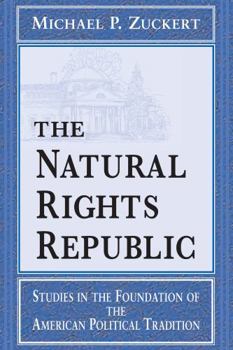Natural Rights Republic: Studies in the Foundation of the American Political Tradition
Select Format
Select Condition 
Book Overview
In The Natural Rights Republic, renowned political theorist Michael P. Zuckert examines the natural rights philosophy as expressed in sources like the Declaration of Independence and aims to counter contemporary confusion by offering an insightful study of the concept that dominated the mindset of the founding generation of the United States.
Format:Paperback
Language:English
ISBN:0268014876
ISBN13:9780268014872
Release Date:March 1997
Publisher:University of Notre Dame Press
Length:312 Pages
Weight:1.05 lbs.
Dimensions:0.9" x 6.0" x 9.1"
Customer Reviews
2 ratings
pure Locke
Published by Thriftbooks.com User , 23 years ago
This book is an absolute must not only for loyal followers of a natural rights theory as basis of the US constitution. Every scholar who wants to research the foundations of American constitutionalism in depth should have this book in the personal library. It his here that he will find pure Lockeanism and is here that Zuckert puts forward his case of Lockean natural rights and social contract theory as ideological basis for the founders in such a concise way that it is difficult to argue against his case. Of course this is what avid Zuckert readers are used to. This book, however, in referring to Jefferson as a natural rights thinker argues the natural rights theory with one of the most convincing witnesses you can find in American history: Thomas Jefferson. Zuckert depicts the Declaration of Independence and American political thought from an interesting perspective, Jefferson's viewpoint. He succeeds in disputing the main opposing theories to the natural rights theory such as the exemplary role of classical Greece and Rome, the continuity theory based on Puritan thought and Bailyn's point that Locke was only one among others influential on American political thought, to name just a few. I did note, however, a certain tendency to neglect historical facts especially as far as the influence of the English common law and Whiggish thought on the framers is concerned. Finally, that Zuckert did not examine the Constitution itself as closely as the Declaration of Independence is not only excusable. It serves a good purpose: to underline the importance of the Declaration of Independence as an outflow of quintessential American thought, thus a document America should be proud of.
Intellectual Tour de Force
Published by Thriftbooks.com User , 25 years ago
Yet again, Michael Zuckert has produced a forceful, challenging, and overly fascinating work of scholarship. His previous work, "Natural Rights and the New Republicanism," in many ways a "prequel" to this volume, was a historical and not to mention philosophical landmark. This work picks up right where he left off. Part I of the work consists of an in depth analysis of the Declaration of Independence. This interpretration bristles with new insight. Unlike many past scholars, Zuckert makes an overt effort to place the Declaration in context. He does this by examining other sources of information, e.g. Thomas Jefferson's "Notes on Virginia" for instance. The end result, I must say, is brilliant. Contrary to modern conceptions, he demonstrates what the Declaration was really meant to say, and, at the same time, how philosophically sophisticated it really was. In Part II, Zuckert endeavors to prove that the United States was indeed founded as the natural rights republic, in a modern, dynamic, forward looking philosophical climate. To begin with, he picks apart the thesis that the American Revolution was merely an extension of the Glorious Revolution undertaken by the Whig ruling class in the late 1680s. This however, is nothing new, especially if one has already read his account of the Glorious Revolution and natural rights philosophy in his previous work. Nevertheless, he shows conclusively the incompatibility between the two Revolutions, primarily, but not wholly, through a comparison of the Declaration of Independence and the English "Bill of Rights." Moving on, Chapters 5 and 6 address the issue of Puritanism and its legacy in early America. Many scholars have proposed that the American Revolution was merely an extension of ideals held by the early Calvinist settlers of the 17th century. It is this thesis, however, that Zuckert completely demolishes. He conducts and in depth analysis of Puritan ideology, as well as its sources. Of particular interest is discussion of Martin Luther's concept of the "Two Kingdoms," and its influence in American thought. To make a long story short, he demonstrates how dramatically Locke's ideas clash with those of the early Puritans. This contention is driven home clearly by an examination of important political/relgious thinkers in 18th centiry New England, Elisha Williams and Jonathan Mayhew in particular. Finally, in Chapter 7 finds Zuckert further pushing his case for the natural rights republic. He takes on the so-called "classical republican" or "civic humanist" thesis expounded by such scholars as J.G.A. Pocock and Gordon Wood, deftly making mincemeat of them. Pressing on, he examines Thomas Jefferson's evolving political philosophy to reveal the truly radical, natural rightist foundations of American republicanism. Although the book is by and large solid, I do have several misgivings about it. First and foremost, Zuckert's Jefferson scholarship is





